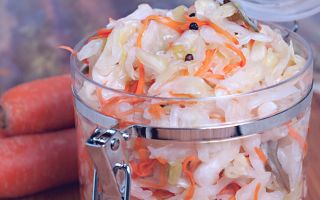Content
- 1 Composition and properties of pickled cabbage
- 2 How many calories are in pickled cabbage
- 3 Is pickled cabbage good for your diet?
- 4 Is it possible to eat pickled cabbage for diabetes
- 5 Pickled cabbage during pregnancy and breastfeeding
- 6 How to pickle cabbage
- 7 Harm of pickled cabbage and contraindications for use
- 8 Which cabbage is healthier: sauerkraut or pickled
- 9 Conclusion
There are many recipes for pickling cabbage. For this, almost all varieties of vegetables rich in fiber and vitamins are used. However, not everyone knows that a traditional dish can replace more than one medicine in a home medicine cabinet. How the benefits and harms of pickled cabbage depend on its properties and contraindications will be discussed further.
Composition and properties of pickled cabbage
To understand what is the use of pickled cabbage, you need to figure out what elements and vitamins it contains.
Composition of 100 g of finished product:

Useful properties of marinated cabbage:
- help in getting rid of parasites, bacteria and intestinal problems;
- strengthening the nervous and immune systems, metabolism;
- lowering sugar, cholesterol, protein breakdown;
- help with problems with skin, hair, allergies, male potency;
- prevention of the development of cancer;
- relief of symptoms of colds and hangover.
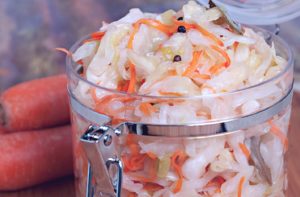
How many calories are in pickled cabbage
Different varieties of pickled cabbage contain different amounts of calories per 100 g:
- color - 63.8;
- sea - 62;
- white cabbage - 56;
- redhead - 52.6.
Is pickled cabbage good for your diet?
The low-calorie vegetable contains almost no fat: therefore, it is ideal for people on a diet. And at the same time it perfectly satisfies hunger.
Another useful property is that it is able to remove cholesterol and harmful substances from the body.
The benefits of pickled cabbage as a dietary product of a quick method of preparation for the body are undeniable, and harm can only be if it is taken in the morning on an empty stomach and in the evening before bedtime.
The optimal combination would be its use with lean meat: this is how animal protein is better absorbed.
Is it possible to eat pickled cabbage for diabetes
The marinated product contains tartronic acid, which helps to lower glucose levels, therefore it is a low-calorie vegetable that, after cooking, practically does not lose its medicinal properties.
In diabetes, pickled cabbage is shown as one of the staple foods in the diet. Such beneficial properties as lowering sugar and cholesterol, will be a good addition to drug treatment.
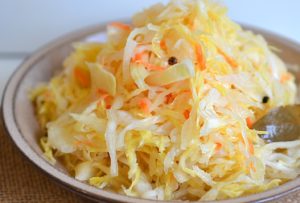
Pickled cabbage during pregnancy and breastfeeding
During pregnancy, doctors recommend pickled cabbage because of its large amount of folic acid, which is extremely necessary at the stage of formation in the fetus:
- tissues and organs;
- blood elements (platelets, leukocytes, etc.);
- nucleins;
- nervous system.
It is also an effective remedy to cope with the problems of emerging toxicosis.
When breastfeeding, the baby receives all the elements and vitamins present in the mother's diet.Some doctors believe that the vegetable provokes the appearance of bloating and colic in the child's stomach, since his digestive system is still unstable.
Others argue that the benefits of pickled vegetables are manifested in increasing immunity in the baby, and its regular presence in the diet of a pregnant woman will help strengthen the nervous system.
How to pickle cabbage
At the first stage, the vegetable is chopped, removing the stalk. Add chopped carrots, bell peppers, beets, berries and other ingredients to taste.
Mix vegetables by hand, avoiding pressure.
With fine shredding, the pickling process will be faster.
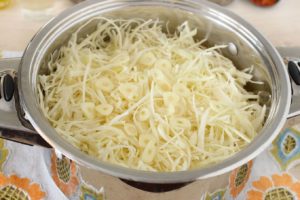
The next step is to prepare the marinade, which includes: water, sugar, salt, vegetable oil, vinegar, spices and herbs (to taste).
Vegetables in the prepared solution are quickly pickled and retain their nutrients.
Quick pickled cabbage recipe
Products:
- cabbage - 1 head of cabbage (medium);
- medium carrots - 1 pc.
For the marinade:
- salt - 3 tbsp. l. (with a hill);
- sugar - 8 tbsp. l. (no slide);
- bay leaf - 5 g;
- garlic - 3 teeth;
- vegetable oil - 1 tbsp.;
- water - 1 l.;
- 9% vinegar - 1 tbsp.
Cooking:
- Cut the cabbage into thin strips.
- Use a coarse grater for carrots.
- Add chopped garlic to the mixed vegetables.
- Add the ingredients for the marinade to a separate saucepan with water (after boiling, keep on fire for 3-4 minutes).
- Without letting the marinade cool down, pour it into the vegetable mixture and press down with a load (the mixture must be completely filled in).
- You can use the finished dish as an independent one or as an addition to the vinaigrette after cooling completely.
Pickled cabbage with beets and garlic
Products:
- cabbage - 1 head of cabbage (medium);
- medium beets - 1 pc .;
- carrots - 2 pcs.
For the marinade:
- vegetable oil - 0.5 tbsp.;
- salt - 2.5 tbsp. l .;
- sugar - 1 tbsp.;
- allspice - 3 - 5 peas;
- garlic - 5 - 7 small cloves;
- vinegar (9%) - 1 tbsp.;
- water - 1 l.
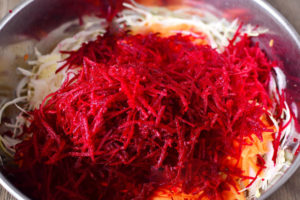
Preparation:
- Chop the cabbage.
- For carrots and beets, use a coarse grater (can be cut into strips).
- In a bowl, mix (or lay out, alternating, layers) cooked vegetables.
- Boil water, add marinade ingredients.
- Bring the marinade to a boil again, turn off and let cool slightly.
- Pour over vegetables so that they are covered with liquid. To cover with a lid. The load is optional.
- Allow to cool completely and refrigerate.
- After 2-3 days, the dish is ready to eat.
Harm of pickled cabbage and contraindications for use
Despite the fact that pickled cabbage benefits the body for a number of diseases, the coarse vegetable fibers, which the plant is rich in, can cause harm to intestinal flatulence, which is manifested by the accumulation of gas and subsequent bloating in the abdomen.
Contraindications to the use of the product concern:
- various diseases of the gastrointestinal tract;
- kidney disease;
- inflammation of the pancreas;
- allergic reactions;
- a tendency to bloating and swelling;
- high blood pressure and myocardial infarction.
Which cabbage is healthier: sauerkraut or pickled
Sauerkraut differs from pickled cabbage in its cooking features:
- when pickling, the vegetable is placed under the load (oppression) until the cabbage juice is released, and then put away in a cold place to stop the fermentation and souring process;
- in pickling, a ready-made marinade is used.
Both cooking methods are beneficial to the body. The differences relate to the following aspects:
When fermented, natural fermentation takes place, and beneficial bacteria are not killed by vinegar.
In addition, this method has a minimum of contraindications harm when used.
Marinated cabbage improves appetite, produces gastric juice, contains less acid, and is easier for the body to absorb. In addition, the quick cooking process speaks in favor of pickling: the product can be used almost immediately for food or rolled up in jars for long-term storage.
Fast cooking also helps preserve the vegetable's nutritional and antioxidant properties.
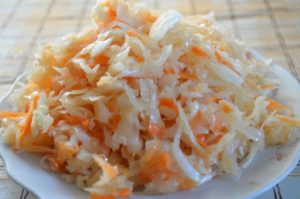
Conclusion
The benefits and harms of pickled cabbage are well studied by nutritionists. Its healing properties are extensive - from preventing colds to reducing the likelihood of developing cancer and strengthening the body as a whole, while the harm of the product can be considered conditional, if we take into account the contraindications.

